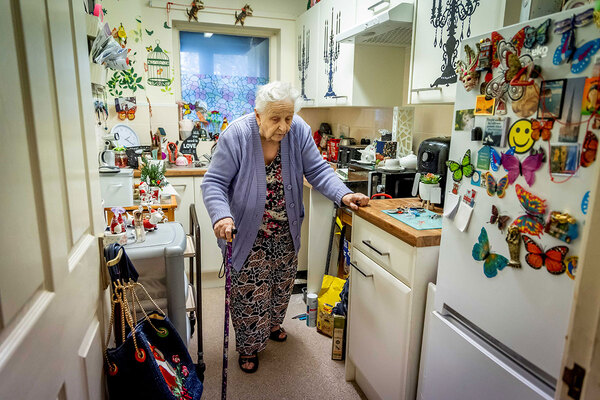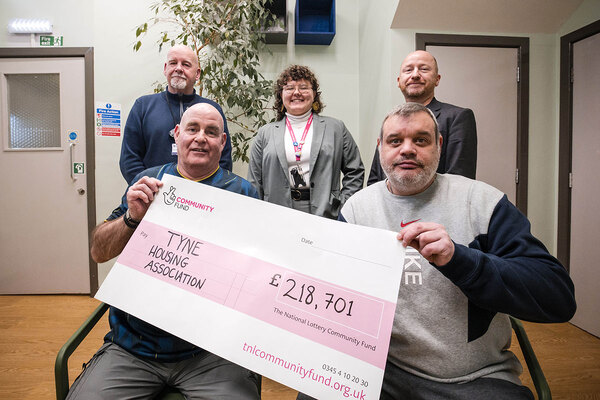A week in the life of… a forensic mental health service manager
Camille Lapaix of Look Ahead manages a specialist forensic supported housing service in east London, which supports 19 male residents aged 18 to 74 with significant offending histories and enduring mental health needs. She talks us through her week
Monday
My Mondays start like a lot of people: wishing it was Friday. Fortunately, coffee exists, and I am back on track. Although as a service manager in a forensic mental health service, every day is vastly different and my weeks are seldom alike. To start, I always make sure to catch up on everything that has happened over the weekend.
At Look Ahead, we use the ‘See Think Act’ (STA) model to embed relational security. Being a forensic service, we especially rely on it to identify what can raise pre-emptive signs of a potential incident. Going through customers’ interactions and reviewing any incident that might have happened allows me to do this.
I also make sure to check in with my team and provide not only any necessary advice, but also any support and motivation. No matter the size of my workload, my staff are the ones working on the frontline 24/7, taking on the brunt of service users’ struggles come rain or shine, and I always try to take any pressure I can off them.
After going through any incidents that might have happened, I review our risk assessments and procedures to ensure constant improvement to our service.
My service is unique, and a number of our residents may have been in institutions, such as secure psychiatric wards, for decades before coming to us. The thought of leaving an environment you have known for so long can be daunting, so I make it a priority to visit (online or in person) the wards of hospitals we received referrals from a couple of times a year.
My goal is to introduce myself and our supported accommodation to the patients and their social workers in order to make ourselves known before our collaboration even starts and create a pre-existing relationship for when/if some of these patients are referred to us.
Tuesday
Our service aims to reduce stays in secure in-patient care, as well as preventing admissions and re-admissions. Our referrals mostly come from secure psychiatric hospitals, and before deciding on assessing an individual, I take into consideration the current dynamics of the customer group staying in the service. We want to create a positive and nurturing relationship between our residents, and I have to be careful about accepting individuals who might initiate a relapse or considerably increase the risks of other customers relapsing.
If the only flat available is right next to a customer currently in recovery from substance use, I will avoid taking on someone known or suspected of dealing substances, for example. I might also look at potential pre-existing relationships between a current resident and an individual referred – the offending world is not that vast, and it happens more often than you’d think.
Once an individual has been identified as a referral with potential, we organise a joint assessment with them and their social worker or care co-ordinator. As much as possible, we prefer letting the individual come to the service so that they can meet members of the team, other customers and see the premises alongside being part of the assessment. Together, we discuss their goals and aspirations and their understanding of their current situation, as well as what they identify as risks to themselves or others.
With every referral, we are provided with a historical and clinical risk management document with a forensic report, which means we already have a lot of information in hand. The assessment enables us to know the person behind the paperwork. Its aim is, first, to understand the person in order to identify the support they need and the risks they might pose and, second, to let the individual see our service, ask questions and decide whether they think it is a good fit for them.
Wednesday
Growing from specialist support worker to team leader and, finally, service manager, I had to leave behind some of the hands-on daily work, but the trainings delivered by our local authority, the NHS and Look Ahead allow me to refresh and update my background knowledge in forensic psychology and criminology, which is one of my favourite things to do.
I always try improving my learning and development to support my growth and upskill myself. Today, I have a training planned on the practices of the mental health act in forensic settings, delivered by our NHS Foundation Trust.
Some of my staff members have booked themselves for the same training, and I am always very proud of my team and their keenness for learning and developing their skills and knowledge, not only to better themselves but also to provide a better support to the customers they look after. This is a quality I always look for when I recruit support workers.
Thursday
On Thursdays, the responsible clinician of the NHS’s forensic outreach team holds a clinic at the service and sees patients – our customers. One of the staff members, generally the individual’s keyworker, attends the meeting with their clinician. This is when they can express any issues or desires around their care, whether it be their medication side-effects or their wish to go on a holiday with their family.
Most of our residents are under Section 37/41 of the Mental Health Act and may have specific restrictions put in place by the Ministry of Justice (MoJ), such as having to spend every night in the service. I sometimes write reports for the MoJ to feed back on the individual’s progress, and with the help of their clinical team, some of the restrictions can be amended to allow the customer to progress in their recovery and move-on pathway.
After meeting the residents, the responsible clinician and care co-ordinators meet with our team to discuss what was said. This allows us to have some reflective practice where we can ask for advice or suggestions if one of our customer’s recovery plateaus. The relationship between the forensic outreach team and our service is close and we work hard to make joint and supportive decisions that the NHS and Look Ahead both agree with.
Friday
Being a service manager can be isolating at times, but fortunately our head of operations organises patch meetings for all relevant managers.
My team and I also try to hold a tenants’ meeting every month to update our residents on any relevant information and to receive any feedback they might have. This is a good occasion for residents to mingle and for us to supervise the group’s interaction. We use a tool to carry out daily monitoring on all our residents’ presentation and behaviour, but seeing them in social situations allows it in a much more organic fashion.
I regularly review each customer’s support plan (a co-produced document about what is important in their life with practical and achievable commitments to making it happen) and risk management plan (also co-produced, this identifies and assesses risk with the aim to put in place a plan to minimise the harmful impact of risks to the customer and others). These are ‘live’ documents, and we ensure that they are up to date every time something happens in an individual’s life.
At the end of my Friday, I make sure to send a quick email to the manager who is on call for the weekend. I mention any current concerns alongside the plans in place, in case an incident happens over the weekend and my staff have to call on-call for support, before finally leaving for the weekend.
A week in the life series
Our ‘A week in the life’ series features housing professionals talking through what they do in their job on a day-to-day basis.
Find out about the different challenges housing workers in a variety of roles face in a given week.
We aim to feature staff from housing associations, ALMOs, local authorities and more.
Click here to nominate yourself or a colleague for inclusion
A week in the life of… a safety and compliance manager – featuring Mark Rowlands at Legal & General Affordable Homes
A week in the life of… a landscape activation manager – featuring Jack Gower at Peabody
A week in the life of… a damp, mould and condensation officer – featuring Andy Sherritt at South Yorkshire Housing Association
A week in the life of… Kensington and Chelsea’s Rough Sleeper Dual Diagnosis Service – featuring Gavin Stewart and Charlotte Northall
A week in the life of… a money guidance officer – featuring Debbie Woodcock at Clarion
A week in the life of… a part-time social prescribing link worker – featuring Dawn Perry at WHG
A week in the life of… a transitions and implementation lead – featuring James Brown at Places for People Living Plus
A week in the life of… a tenancy support manager – featuring Jackie Bird at Community Gateway Association
A week in the life of… a head of asset management – featuring Zoe Carmichael at Alpha Living
A week in the life of… an environmental sustainability manager – featuring Alice Lovatt at Sanctuary
A week in the life of… a housing support manager – featuring Sara Dunnet at ForHousing
A week in the life of… a place-shaping manager – featuring Sarah Smith at Vivid Plus
A week in the life of… a part-time work planner – featuring Siwan Hammond at WHG
A week in the life of… a marketing communications customer lead – featuring Leah Thompson at Thrive
A week in the life of… a housing co-ordinator – featuring Sharon Chambers at Sovereign
A week in the life of… a senior community partnerships manager – featuring Brian Hamlin at The Guinness Partnership
A week in the life of… an asset compliance team leader – featuring Emily Elsworth at Longhurst Group
A week in the life of… a business continuity manager – featuring Chloe Fox at Abri
A week in the life of… an employment advisor – featuring Vanessa Loveridge at A2Dominion
A week in the life of… a housing association surveyor – featuring Andy Davies at Thrive Homes
A week in the life of… a youth support worker – featuring Treaser Jassal at Poplar Harca
A week in the life of… a head of community and housing-related support – featuring Daniel Revell-Wiseman at Longhurst
A week in the life of… a building safety manager – featuring Lisa Leather at Trafford Housing Trust
A week in the life of… a forensic mental health service manager – featuring Camille Lapaix at Look Ahead
A week in the life of… a communities apprentice – featuring Alex Perrin at Clarion Futures
A week in the life of… a supported housing officer – featuring Tamara Suppria at Housing Solutions
A week in the life of… a senior occupational therapist – featuring Gemma Carr at Grand Union Housing Group
A week in the life of… a concierge officer – featuring Tyrone Wilson at Citizen
A week in the life of… a policy and practice officer – featuring Hannah Keilloh at the Chartered Institute of Housing
A week in the life of... a delivery manager – featuring Rebecca Bewick at Gentoo
A week in the life of… a fire safety project officer – featuring Victor Liburd at BPHA
A week in the life of… a ‘HomelessWise’ information co-ordinator – featuring Fiona McCarthy at St Mungo’s
A week in the life of… a national property development manager – featuring Heidi Fisher at Housing 21
A week in the life of… an apprentice electrician – featuring Selda Ponari at Bournville Village Trust












